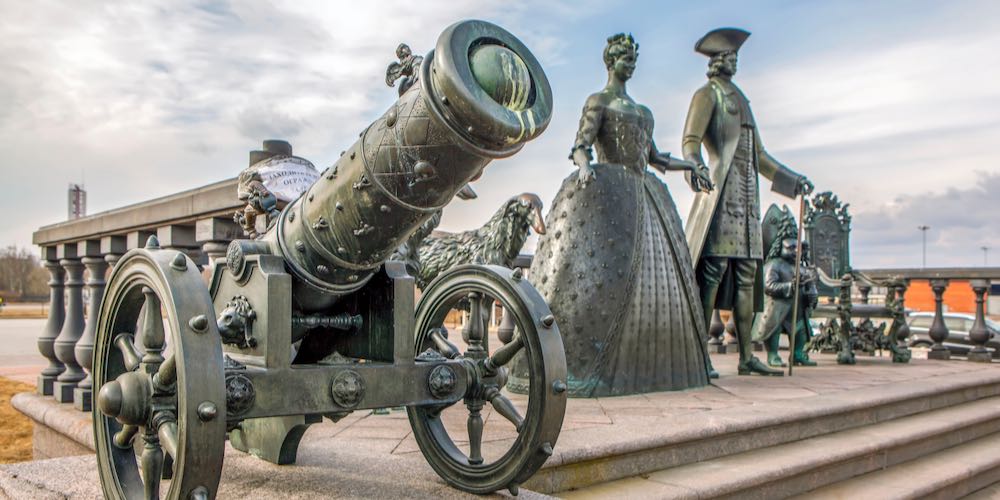Opposing radical individualism, Lawler and Reinsch look to the unwritten constitution as the key to understanding how to form citizens in a democratic age.
Autocracy in Russia
For much of his reign, Vladimir Putin has been working to put himself at the head of a “conservative international.” He wants to be seen as the great defender of Christendom, a champion of traditional values who can rescue the world from godless liberalism. In a recent statement, for instance, Putin said that Russia needs to lead a resistance to “the global crisis of civilization and values that leads to humankind losing traditional spiritual and ethical waypoints and moral principles.”
Most people surely can see through the Butcher of Bucha’s propaganda. Putin’s invasion of Ukraine has been characterized by war crimes, atrocities, and acts of genocide—it is absurd to hear him speak of “ethical waypoints and moral principles.” There is nothing remotely Christian about the way Putin has targeted civilians. Unfortunately, though, some conservatives in the West seem to be at least somewhat receptive to Russia’s “traditionalist” messaging. Few on the right have fully embraced Putin, but too many have expressed a certain twisted admiration for how he “owns the libs.”
Some may feel sympathy for Putin out of partisan reflex. Even if President Biden has dragged his feet on delivering vital aid, he has made support for the Ukrainian cause a major rhetorical priority. His Democratic party is increasingly politicizing the issue, too, in a cynical attempt to alienate moderate voters from Republicans. In our polarized moment, supporting Ukraine should be a bipartisan cause. But mere partisanship cannot fully explain the respect certain figures in right-wing media show a tyrant like Putin.
Many on the far-right see Putin’s Russia as a bulwark against Western degeneracy. They rightly see aggressive social liberalism and the “woke” movement as threats to American culture. But by hailing Putin as a leader against Western leftism, these reactionaries are betraying the very principles that make America great.
Custine’s critique of democracy is not unlike contemporary conservative critiques of liberalism. Revolution turns the whole nation into a victim, sacrificed on the altar of impious abstractions and profane falsehoods.
This is not the first time in history that Western rightists have looked to Russian autocracy in search of weapons to use against liberalism. In nineteenth-century France, Alexis de Tocqueville understood that the conflict between Russian principles and American principles would define the next stage of mankind’s political development. Inspired by Tocqueville’s analysis, another writer, named Astolphe de Custine, traveled to Tsarist Russia in the hopes of understanding the alternative to liberalism.
What Custine saw in Russia terrified him. Far from autocracy securing the possibility for human flourishing against anarchic liberalism, Custine came to understand it as another kind of lawlessness. Even as he maintained his skepticism about Jacobin radicalism, Custine came to understand Russia offered no legitimate alternatives to constitutional government. Perhaps Custine’s journeys in the empire of the Tsars can help twenty-first-century conservatives understand why defeating Putin’s invasion of Ukraine is essential to the future of freedom.
Tocqueville’s Prophecy about America and Russia
Alexis de Tocqueville concludes the first volume of Democracy in America by drawing a contrast between the American and Russian peoples. He was struck by how, in the early nineteenth century, both countries took a leading role in world affairs. Other countries seemed to have arrived at their natural limits, but Russia and America were both expanding their frontiers.
Tocqueville saw great forces at play behind the course of human events. In his mind, the United States and Russia represented alternative arguments for the best way of life. The choice before mankind boils down to a decision between these two arguments. Even more important than any armed conflict between the two regimes were the philosophic principles each embodied.
In Russia, the argument for authority prevails. The collective is valued more highly than the individual; central power directs the lives of those under the regime; and dissent is stamped out. In other words, the organizing principle behind the Russian regime is the sanctity of authority.
In America, the argument for freedom prevails—the individual’s rights come before the collective; power is dispersed as widely as possible; and dissent is commonplace and even encouraged. In other words, the organizing principle behind the American regime is the sanctity of freedom.
Tocqueville says that Russians tend to concentrate “all the power of society in one man,” whereas Americans decentralize power among the people. “The one has freedom for his principle means of action,” Tocqueville writes, and “the other servitude.” He concludes this arresting passage with a paragraph many have interpreted as a prophecy of the Cold War conflict between the United States and the Soviet Union: “Their point of departure is different, their ways are diverse; nonetheless, each of them seems called by a secret design of Providence to hold the destinies of half the world in its hands one day.”
It is clear to anyone who reads Democracy in America that Tocqueville favored the argument for freedom. Though he was honest about America’s manifold flaws, he nonetheless believed that equality under the law, political liberty, and other principles of the American Founding were the best hope for good government and human flourishing.
Custine’s Search for Authority
Not everyone agreed with Tocqueville on this point, however. One of his readers—Custine—worried that democratic revolutions were squandering the Western tradition and throwing society into disorder. Upon reading the first volume of Democracy in America, Custine was inspired. If Tocqueville could travel to America to understand the argument for freedom, he thought, then he could travel to Russia to understand the argument for authority. His reflections on the journey were published in 1843 as Letters from Russia.
It is easy to understand why Custine sought out the Russians’ argument for authority. He was born in 1790, the son of a marquis who nonetheless supported the French Revolution. Sadly, that sympathy was not enough to save the elder Custine from the guillotine’s blade. In Letters from Russia, Custine says that as a young boy, “the servants scarcely spoke to me of anything but the misfortunes of my parents; and never shall I forget the consequent impression of terror which I experienced in my earliest intercourse with the world.”
Custine came to Russia hoping to find that the autocracy encouraged the people to pursue virtue—but he found that living under tyranny made many of the people into little tyrants themselves.
Throughout the book, Custine consistently holds that the French Revolution was simply a brutal murder spree, perpetrated by vicious ideologues, and defended by ugly sophisms. Jacobinism’s radical democratic creed is, in Custine’s mind, deeply anti-human. In this regard, Custine’s critique of democracy is not unlike contemporary conservative critiques of liberalism. Revolution turns the whole nation into a victim, sacrificed on the altar of impious abstractions and profane falsehoods.
Custine left France primed to accept the arguments for authority he thought he would find in Russia. His personal experience and political beliefs biased him in favor of the strength of the Tsars, and the supposed orderliness of their empire. But his experience of Russia itself changed everything for Custine.
The Tyranny Custine Saw in Russia
“I went to Russia to seek arguments against representative governments,” Custine wrote. “I return a partisan of constitutions.” The actual operation of Russian autocracy horrified him. Custine saw in its brutality and leveling tyranny an echo of everything he hated about the Jacobin Terror.
Throughout the book, Custine recounts anecdote after anecdote about autocrats abusing their power. It makes for depressing reading. The horrors in his stories about Russian serfdom resemble the horrors of American slavery. The willingness of the state to use the sword against the people shocked Custine. He deplored the way Russia’s cities resembled military barracks.
Custine came to Russia hoping to find that the autocracy encouraged the people to pursue virtue—but he found that living under tyranny made many of the people into little tyrants themselves. He came to see that “the excesses of despotism” produce only “moral anarchy.”
Custine especially lamented the way that Russian autocracy encouraged “a population of deputies and sub-officials” in the bureaucracy to develop an “air of importance and a rigorous precision which seems to say, though everything is done with much silence, ‘Make way, I am one of the members of the grand machine of state.’” Arrogance and lies permeated tsarist Russia, and Custine hated what he witnessed.
Above all, though, Custine’s spirit rebelled against the religious oppression which pervaded Russia. “The Russian policy has melted the church into the state, and confounded heaven and earth,” Custine said. “A man who sees a god in his master, scarcely hopes for paradise, except through the favor of the emperor.” The Jacobins and the Tsars both presented themselves as representatives of some divine principle. This sense of self-righteousness, Custine says, is exactly what makes for the worst kind of tyranny.
Custine came to believe that Russian autocracy was a great anti-social conspiracy to maintain the vast inequalities between those with power and those without it. He said that “there is at this day, in Russia, more real inequality in the conditions of men than in any other European land.”
None of this is to say, though, that Custine was utterly disgusted by every element of Russian society. In his travels, he found much beauty to admire. In one letter, he describes the glories of acapella singing in an Orthodox marriage service: “I could fancy I heard the heart-beating of sixty millions of subjects—a living orchestra, following, without drowning, the triumphal hymn of the priests. I was deeply moved: music can make us forget for one moment even despotism itself.”
Ultimately, Custine thought that the task of the West was to find the proper balance between the argument for authority and the argument for freedom:
Though a democrat in Russia, I am not the less in France an obstinate aristocrat: it is because a peasant in the environs of Paris is freer than a Russian lord, that I thus feel and write. We must travel before we can learn the extent to which the human mind is influenced by optical effects. This experience confirms the observation of Madame de Staël, who said, that in France, “One is always the Jacobin or the ultra of someone else.”
In the conclusion of Letters from Russia, Custine adds that this aristocracy must be rooted in restraint and the pursuit of virtue:
I hate pretexts: I have seen that in Russia, order serves as a pretext for oppression, as, in France, liberty does for envy. In a word, I love real liberty—all liberty that is possible in a society from whence elegance is not excluded. I am therefore neither demagogue nor despots; I am an aristocrat in the broadest conception of the word. … Barbarism takes more than one form: crush it in despotism and it springs to life again in anarchy; but true liberty, guarded by a true aristocracy, is neither violent nor inordinate.
Custine understood that societies should not liberate citizens from every duty or obligation. But his travels in Russia taught him, like Tocqueville’s travels in America, that human beings should be free to pursue the destinies God has in store for them. The proper object of conservatism is what Edmund Burke once called “an exalted freedom.” Order may be the first need of all, but it is not the sole or final need. Arbitrary government is inherently disordered. There is no reason for the West to imitate the disorders of Russian autocracy.
The Argument for Freedom and the War in Ukraine
Vladimir Putin’s actions in Ukraine have proven that tyranny still characterizes the Russian regime despite the years that have passed since Custine traveled to Saint Petersburg. Tsars may have given way to communist ideologues, and the Soviet Union may in turn have lost its grip on Eastern Europe—but always the argument for authority prevails in Russia. In Russia, central power has regularly crushed individual liberty.
Putin understands that Ukraine’s decision to stand free, maintain its independence, and defy Russian tyranny is a threat to the argument for authority. In a paranoid essay published just seven months before he launched his invasion, Putin claimed that Ukraine is being turned into an “anti-Russia,” and even that Ukrainian independence “is comparable in its consequences to the use of weapons of mass destruction.” The idea of a functional Slavic democracy on Russia’s Western border is unacceptable to Putin precisely because it would discredit the argument that authority is the primary requirement for human flourishing.
If a free Ukraine can survive this onslaught and thrive in its aftermath, the entire ideological edifice of Putin’s despotism would be thrown into question. More and more Russian citizens may ask their regime to respect the basic freedoms they are owed as human beings. They may demand Putin open the political system, purge corruption, and give the people power they have been denied for centuries.
“The spectacle of a people’s struggling energetically to win its independence is one that every century has been able to furnish,” Tocqueville wrote in Democracy in America. In our century, Ukraine is providing a fresh example of such a struggle. Ukrainians are making the argument for freedom—and Americans should be proud to make it with them.



